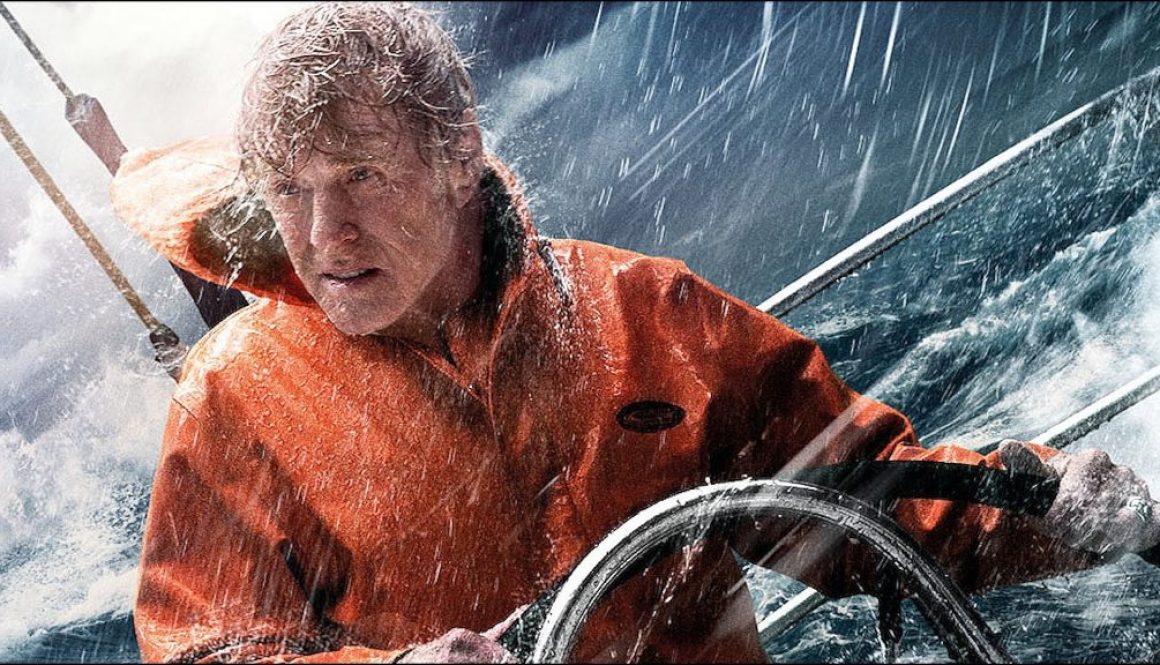REVIEW: All Is Lost (2011)
J.C. Chandor impresses in his post-Oscar nomination, in a near wordless stranded-at-sea spectacle that is All Is Lost, starring Robert Redford.
A man, his yacht and endless miles of the Indian Ocean. In this artistic interpretation of the survival tale, Robert Redford stars in the standout film of the year that is All Is Lost, from Oscar nominated writer-director J.C. Chandor.
As close to pure existential cinema in mainstream multiplex’s, All Is Lost is as close as we’re going to get these days. Chandor’s vision begins with Redford’s character voiceover, dubbed “Our Man”, as he writes a letter of apology to an unknown recipient. All Is Lost introduces us to the story of an unnamed sailor who drifts along the isolated seafront landscape as time passes by, until a collision with a lost shipping container, containing hundreds of trainers, pierces his yacht, named “Virginia Jean”. Whilst the sea pours into his breached hull, effectively ruining his radio system and computer navigation equipment, his attempt at repairing the craft and its equipment are eventually futile. Yet, submerged into a crisis of potential drowning, “Our Man” seems no more disconcerted by this, and continues even though at times he is physically underwater.
With his ever-present mentality of survival, the sailor unknowingly sails into the path of a violent storm, which re-pierces the already-breached hull and capsizes his yacht, making it in-operable. Barely surviving his latest onset, the sailor decides to abandon ship in an inflatable life raft, salvaging whatever he can to survive in an attempt for rescue. Using only a sextant and nautical maps to chart his progress, which he begins to learn, forcing the newly inflated vessel into the ocean currents to carry him into a shipping lane in hopes of hailing a passing vessel. But with the sun unrelenting, sharks circling, failed attempts at being spotted and his survival supplies dwindling, the ever-resourceful sailor soon finds himself staring mortality in the face.
All Is Lost is shaped by the popular tastes of the audience; following the minimalistic survival tale sub-genre which has been under recent demand, due to Alfonso Cuarón’s Sci-Fi thriller, Gravity (2013). Much like Cuarón, Chandor fulfils the expectation, and then some with this stellar piece of cinematic work from the vast beautiful landscape and cinematography, to the ambient, yet deadline score. Which accommodates the sudden change of calmness to catastrophe the narrative produces with the use of the opening voiceover and flashback elements at the beginning of the film, as well as the climatic adrenaline pumping scenes “Our Man” encounters. Edward Sharpe and the Magentic Zeros’ lead singer, Alex Ebert composes the hauntingly beautiful film score, which won him a Golden Globe for “Best Original Score – Motion Picture”. Also, the unforgettable post-production editing of Pete Beaudreau which tells the story and further accentuates the open space nature the film produces from the artistic guidance of Chandor and Frank G. DeMarco’s cinematic influences, which are imprinted in the cinematography as they create a distinct antipodal difference between the vast ocean and the cramped space of Redford’s dying vessel.
Chandor recalls in an interview with thewrap.com how he pitched the idea to “Lionsgate, [who] did Margin Call” [with Roadside Attractions], and how they were interested, then “…Universal, a big huge conglomerate, [came in too],” the director said, “And as long as we priced it correctly, they were willing to take the risk”. The further talk about how they “spent just under $9 million, which to me felt like $100 million after Margin Call, and that “every page that’s in my script, we shot. I never really felt like I was wanting for much, except for a huge salary.” Though he was also thankful how Redford was very keen on the production.
His weathered face and bushy strawberry-blonde locks are instantly recognisable, and for a man in his late 70s, he tackles the role’s intense physical requirements with no use of computerised special effects during the exhilarating sequences, that carries the whole film along with his improvisation and use of minimal dialogue. Redford produces the performance of a lifetime and was graciously nominated “Best Actor” in drama at the Golden Globes. Though unsuccessful in winning, his performance and improvisation is well-deserving of the name “Our Man” at the end credits.
All Is Lost is a mainstream movie rarity, a virtually wordless piece of cinema that focuses on one character, his will and tenacity throughout a 106-minute sprawl. There’s nothing extravagant about the visual effects of the film, we have no knowledge of the character or his inner-thoughts, merely just empathy for his current situation. It’s man vs. nature, a story of man’s battle against the harsh sea, which sounds heavily symbolic but Chandor has a jewel with Redford acting prowess attached to this film, which simplified the narrative for him and the audience. This is a far cry from Chandor’s full-directorial debut Margin Call (2011), the dialogue-heavy financial crisis with an ensemble cast, which displays his versatility in writing and directing. It is this film which captivated the attention of Hollywood and star Robert Redford after Chandor sent him a script of the back of his Sundance debut, which allowed him to make this into making a dramatic piece of cinema.
All Is Lost is a challenging production for everyone involved, including the viewers, but it proves to be a worthwhile effort for both, making this film one of the standouts for the year. A must see.
Dan Lewsey
All Is Lost is out now on iTunes, DVD and Blu-ray.
